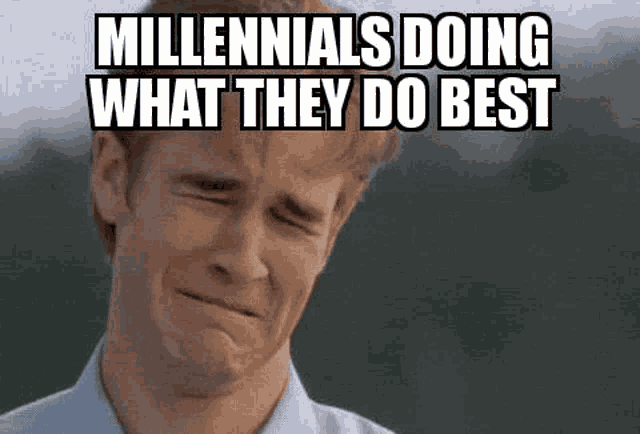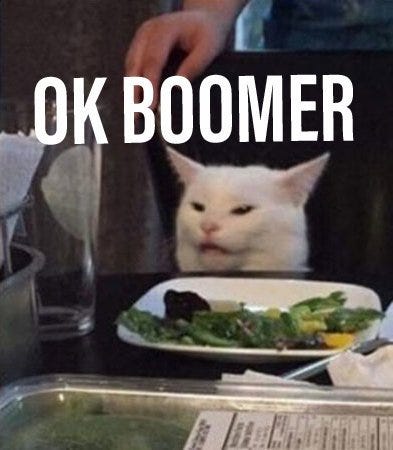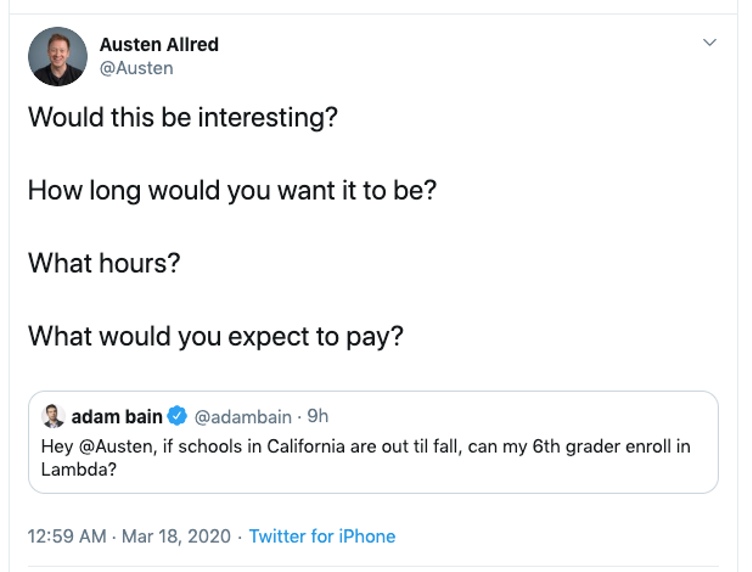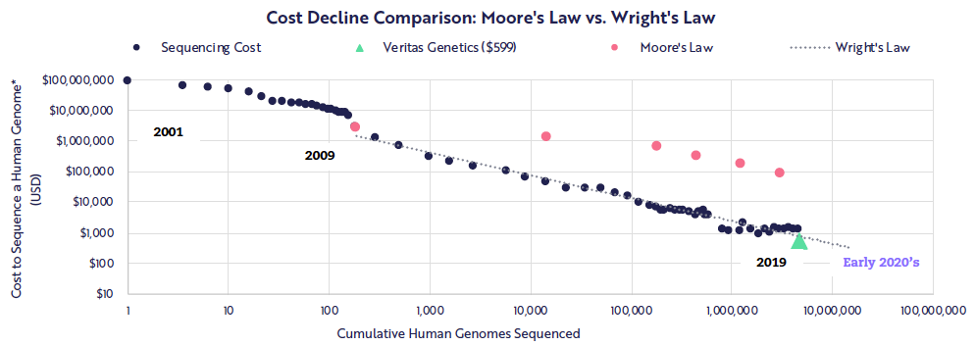By Santiago Hunt – Originally published March 18th, 2020 in Medium.
In the midst of the COVID-19 crisis, I put my thoughts together and made predictions on what the next decade will hold in store for us in the aftermath of the disease.
None of these predictions pertain to the disease per se or to the short term geo-political/economic landscape. There are better sources than me for those.
4 predictions + 1 “Fork in the road” scenario. Let’s dive in:
1. The divide between older and younger people will widen
Generational disagreements are as old as time. There are even quotes allegedly made by Aristotle and other Greek philosophers on the subject.
But as of late, they have been exacerbated. Climate change and Greta Thunberg. Brexit and its generational vote divide. AOC on one side of the court, Donald Trump on the other. Broken pension systems across the planet resulting in more and more government spending needed to fund these, leading to unsatisfied demands from younger people. The mounting pressure of student debt and people pushing for “bailouts” …but who will pay for it?
Perhaps, the best picture of this is the “Millennials discover…” vs “Ok Boomer” meme battle.

Look at any of the underlying cultural movements in the world and you will see a generational conflict within them. HK protests. Veganism. Niunamenos and other feminist movements in LatAm. Cannabis legalization. You name it. Of course, these moves respond to different reasons, not just age. And obviously not all younger people are “Vegan” (insert cultural phenomenon), and not all older people are against it. But you get the point.

As said before, this division is as old as time. But social media has given younger people a global massification tool for their messaging, a tool which prior generations never had…and younger people are using it.
COVID-19 brings this divide to new heights. Data from South Korea/China/Italy points to the fact that the prime carriers of the disease are asymptomatic (or mildly symptomatic) young people. Yet older populations are the most susceptible to the illness. And no matter how bad (and let’s hope it’s not bad), global isolation will have economic costs, where younger people will pay most. Even if a few years from now we (hopefully) look back and see COVID-19 as a passing storm, the scars of this underlying generational conflict will run deep.
Expect a very complicated decade moving forward in particular regarding pension funding, healthcare discussions and a steeper “us vs them” rhetoric in many cultural fronts. All of this goes back to one common seed: Experience vs. Immaturity. Old vs. New.
(In case you’re wondering, I’m 38, technically a millennial, but too old to be part of the young, and too late to the world the generation prior to me lived in).
2. Working from home won’t be a success. Learning from home will be. And the MetaVerse is being born as we speak.
I’m a huge fan of remote working. In the past years I’ve had to work on a daily basis with teams in multiple geographies, in some cases 8–12hs away (India, China, Singapore). It is without a doubt a secular trend which will keep growing.
However, our COVID-19 WFH experience will be disappointing for those who say “remote is the new default”. For two reasons:
1) It’s really (really) hard to work from home if young kids are around.
2) Successful remote working requires some basic principles which I believe can’t be learnt overnight: i) Asynchronous communication ii) Written, not oral culture iii) True employee empowerment (you must be ready to give up most of those casual check ins with peers/bosses).
Most companies are light years away from these behaviors. While they’ve been able to incorporate flexible work arrangements, the backbone of their culture remains built upon “communal office space” dynamics.
While WFH will do so-so, learn from home will THRIVE. Online learning will be turbocharged thanks to the COVID-19 onslaught. Even given suboptimal contents and formats, a lot of students will see that “there’s not that much of a difference” in many (not all) cases. Specially in the college/specialization arena. Couple this with massive cracks in the system when you compare tuition cost of presential vs online/blended methodologies… you get the picture.
I am personally biased here. I’ve now been actively learning online for 2+ year, mostly in the realm of coding, data analysis + visualization and BI. I too was guilty of that initial prejudice where I thought “online was for the lazy; content is subpar”. I was SO wrong.
Some personal observations:
– In a class setting, you go as fast as what 75% of the class can do. If you happen to be in the bottom 25%, too bad. If you can go faster, you get bored, lose focus and miss out on important stuff. Online, you go at your own pace.
– “Efficient googling” is a skill you want to develop. The correct answers for (almost) every question are online. So are the incorrect ones. And it’s very easy to get trapped in a YouTube rabbit hole.
One of my favorite case studies in the space is Lambda School. Lambda is not only revolutionary because of how it does online, but also because of its ISA model, where you only pay once you get hired and based on your salary. Still, online learning is at the heart of Lambda. Coursera is another fantastic resource, and one which is not only about code/IT/etc. Khan Academy. Scholastic. The list goes on.
That’s not all. What happens if we’re facing an extended lockdown? I found this tweet which Is telling:

Finally, the Meta-Verse is coming. What’s the Meta-Verse? Imagine a virtual arena where we can conduct almost all of our interactions. A la “Ready Player One”, to name one example. We are still very limited from a technological capability standpoint, but I can’t help think that these weeks will stir the imagination of many builders. Fortnite was already a place of gathering for people around the world, and remote social interaction will only grow after COVID-19.
3. Meditation becomes mainstream
Some people will argue that meditation is already mainstream. My counterargument: what is the 6 month penetration of a 3+ times/week, 15’+ length practice across adults? I don’t have the answer, but I am sure it is small.
For all the chatter behind meditation apps and the vocal meditation advocates, there doesn’t seem to be a fundamental populational surge. When in doubt, I like to look at Google:

While there is a positive trend, I think COVID-19 will take it to a new level. The mental stress, the limited amount of recreational options and the very low bar when it comes to adoption requirements will push many to try meditation.
The wider effects of quarantine are hard to grasp. What will social isolation make us rediscover? Stimuli deluge in omnipresent. Most of us have, to some extent, a pervasive feeling of too much information and a “drowning” sensation associated to it. While smartphones and online communication will still be available, quarantine will forcibly reduce the inputs into our “system”. I anticipate most people will curb their “stimuli” consumption, perhaps after an initial stimuli binge. Meditation and introspection, as well as many other practices, fit like a glove here.
Maybe, COVID-19 will teach us to slow down, to be more present, to note how everything is impermanent and how it is up to cherish what we have. Let’s hope so.
4. The decade of biotelemetry and personalized DNA mapping
Sooner or later, I am confident we will be able to move past COVID-19. At what cost? Who knows.
But there’s a murky consequence in the horizon: We will revisit our healthcare systems across the world. Not sure what will be achieved here. Healthcare is complicated, and it gets more complicated as populations grow older (both in expected age as well as in weight vs genpop).
Yet, two things stand out to me very clearly though: Biotelemetry and personalized DNA mapping are going to become a thing.
What’s biotelemetry? Simply put, the tracking of vital signs in real time. This already exists today. When at a hospital, you have sensors that track HR, SpO2, etc. There are mobile products that allow this as well. Apple watches, Oura rings (tracks your sleep patterns), Dexcom constant insulin monitors. But we are only scratching the surface.
The following equation pictures it:
Online ubiquitous access + Big data processing capability + Noninvasive yet accurate sensors = Biotelemetry boom.
Couple that with a massive societal health anxiety, and you can foresee the potential.
Sensor technology is not there yet, but it is nothing that cannot be unlocked with capital investment. Check out the Dexcom insulin continuous monitor to get a flavor of what can come (Disclosure: I own no position in this company at the time of publishing).
What about personalized DNA mapping? ARK Investments forecasts that circa 2021 we will hit a DNA sequencing cost of ~1000 USD. This (while still steep for out of pocket) will unlock a cohort of potential buyers which will in turn lead to reduced mapping cost per Wright’s law.

DNA mapping applications (which have arguably stalled vs. expectations in the last few years) will unlock many doors. Imagine you can run a yearly mapping and detect a genetic mutation which might be causing a cancer which would be undetectable otherwise. Of course, this is definitely not around the corner. But individualized DNA data + data analysis capabilities = A revolution is coming.
5. A fork in the road
Whatever happens, society will face a fork in the road.
One path leads to a stronger society. One where the most individualistic understand that there is a very relevant role for centralized governments and that “all men for themselves” leads nowhere. And where the advocates of “Big State” see that we make it through COVID-19 thanks to our individual sense of responsibility (and our individual fear of criticism from our peers), not because of what governments tell us to do.
In this path, we acknowledge that most of our problems are of a global nature, be it pandemics, climate change, poverty or growing societal divisions. We develop globally coordinated responses to confront these issues. We begin to understand that the “nation-state” construct is increasingly obsolete in this world we will live in. And act accordingly as human beings, first and foremost.
The other path leads to a bleak world. One where we erase much of the gains of the second half of the 20th century and the beginning of the 21st. Where we grow increasingly tribal, increasingly suspicious, increasingly paranoid and increasingly accusatory. Where lack of trust becomes endemic, where neither institutions nor individuals are trustworthy. Where we move into a zero sum mentality. Us vs. them.
In this path, climate change wreaks havoc slowly but steadily. More people become misplaced as conflicts pop all over. US becomes locked in a standstill because of its domestic squabbles. “Pax Americana” comes to an end, leading to increased tensions in the Middle East, Eurasia and Latin America. The advance of science comes to a grinding halt as world growth stagnates, making everything a win/lose situation. And above all, we lose part of our empathy for those that surround us.
“You must choose, but choose wisely” (Indiana Jones and the Last Crusade)
— — — — — — — — — — — — — — — — — — — — — — — — — — — — — — — –
Stay safe everybody. And to the best of your ability, help take care of others.
“Frodo: … I wish none of this had happened.
Gandalf: So do all who live to see such times, but that is not for them to decide. All we have to decide is what to do with the time that is given to us.”
(J.R.R. Tolkien — The Lord of the Rings)
